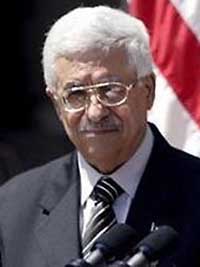Rice, Palestinian president leaving for Jordan, Europe after unproductive summit
Palestinian President Mahmoud Abbas departed from the West Bank on Tuesday for talks in Jordan and Europe, a day after failing to persuade Israel or the U.S. that his incoming unity government would fulfill conditions for restoration of vital foreign aid.

His first scheduled stop on Tuesday was Jordan, where U.S. Secretary of State Condoleezza Rice also planned a visit to see Jordanian King Abdullah II before she would report on Monday's inconclusive Mideast peace summit at a gathering of world powers in Berlin.
Abbas also was headed to Germany along with stops in Britain and France in a campaign to convince skeptical Western leaders that the deal he forged with the ruling Islamic Hamas reflects his moderate stand.
At stake is about $1 billion (EUR760 million) in foreign aid for the Palestinian government cut off after the militant Hamas won legislative elections and took power nearly a year ago. Israel, the U.S. and the European Union label Hamas, which is committed to Israel's destruction and has killed hundreds of people in suicide attacks, a terror group.
Monday's summit in Jerusalem with Rice and Israeli Prime Minister Ehud Olmert foundered on the issue of the terms of the government, to be made up of Hamas, Abbas' Fatah and carefully chosen independents.
The U.S. and European Union insist that any Palestinian government must recognize Israel, renounce violence and accept past peace accords. Hamas has rejected those conditions. The unity accord, hammered out earlier this month in Mecca, Saudi Arabia, pledges only to "respect" past agreements.
Monday's gathering came after a six-year lull in such U.S.-brokered sit-downs, but ended with no new agreements. The Israeli and Palestinian leaders, however, did agree to meet again, and Rice said she expected to return to the region soon to revive an internationally backed peace plan known as the "road map."
"I hope that the Arab states also understand that they have a role to play in this," Rice told reporters in Jerusalem. "This isn't just what the United States can talk about with the Israelis and the Palestinians. How about some of the ideas that were there in the Arab initiative? Why can't we get some of that going, too?"
Rice was referring to a dormant 2002 Arab peace proposal that would have offered wide Arab diplomatic recognition of Israel in exchange for Israel's retreat to its borders before the 1967 Mideast War, when Israel captured the West Bank and east Jerusalem.
"I don't want others to stand on the sideline and say, you know, the United States needs to deliver the completion of the roadmap. Everybody's got obligations. And one thing that I'll be talking to the Arabs about is what can you to do make this happen."
The Jordanian king is one of the U.S. allies with public misgivings about the possibility of civil war among the Palestinians, as well as in Iraq. Jordan has taken in hundreds of thousands of refugees from Middle East conflicts.
Abdullah and other Sunni Arab allies have strongly urged the Bush administration to energize peace efforts between Israel and the Palestinians, partly to improve the Palestinians' lot, partly to tamp down Islamic extremism that those government see as a threat and partly to counter the influence of Shiite Iran.
Monday's three-way meeting was initially meant to offer weary Palestinians an opportunity to open discussions on the contours of an eventual independent state alongside Israel.
It also was a way to strengthen Abbas in his power struggle with Hamas, which surprised the Bush administration by defeating Abbas' secular Fatah Party in elections 13 months ago.
But the meeting was overshadowed by Abbas' unity deal with Hamas. Abbas, a moderate, has said the unity deal is the best he can get from Hamas and goes a long way toward stabilizing the region. The power-sharing deal is seen as crucial to halting internal Palestinian fighting that has killed more than 130 since May.
Olmert said he and Abbas agreed to maintain an open channel of communication, focused both on improving the lives of Palestinians and stopping Palestinian violence.
Palestinians were dissatisfied. "What we have heard today has nothing to do with a partnership," said Mohammed Dahlan, an Abbas confidant.
Subscribe to Pravda.Ru Telegram channel, Facebook, RSS!


